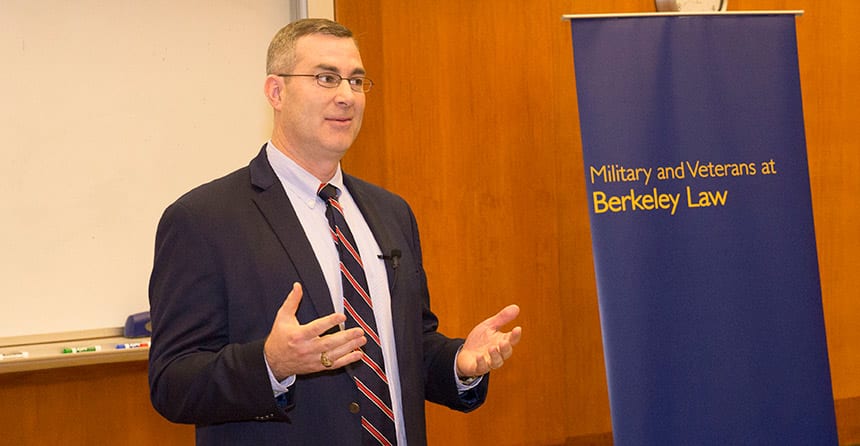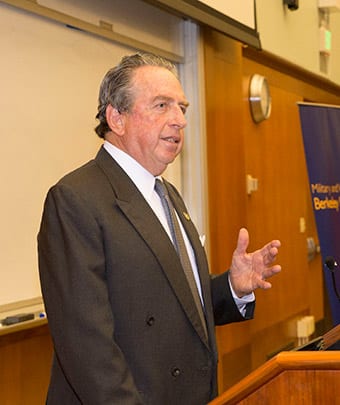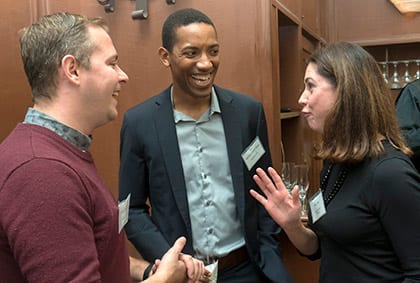
By Andrew Cohen
January 31 offered a prime example of the growth in military and veteran students and programming at Berkeley Law.
A lunchtime talk about the law and armed conflict, the announcement of a military and veterans scholarship, and a networking function for area law student veterans.
Held at the Marines’ Memorial Club in San Francisco, the Bay Area Law Schools Networking Event was co-hosted by the student group Military and Veterans at Berkeley Law and included judges and employers from large firms and government offices.
“The idea is to build a community of veterans and military affiliates within the legal profession,” says Bonifacio Sison ’20, who co-leads MVBL with Michael David Harris ’20, Elizabeth Hall ’20, and Nathan Keller ’19. The event drew about 50 law students and attorneys.

In recent years, Berkeley Law has fostered a more welcoming environment for military veterans at the school. This year’s 1L class had the school’s highest number of admitted veterans (11), and programming is increasing.
During the lunchtime presentation, Lt. Col. Shane Reeves discussed an approach to targeting—the process of choosing objects or installations to be attacked, taken, or destroyed in warfare—that respects the principle of distinction, protects civilians, and is practical to implement. A law professor at the U.S. Military Academy in West Point, Reeves addressed these issues in an upcoming Berkeley Journal of International Law article.
Before his talk, Ken Cohen ’69 announced a new campaign for the Berkeley Law Active Duty Military and Veterans Scholarship Fund. As campaign chair, Cohen has enlisted gifts and pledges exceeding $75,000 from classmates Peter Snowden, Mark Bertelsen, Bill Rauth, Stu Tobisman, and Thomas Cooper, as well as Richard Roeder ’72.
Berkeley Law will use revenue from this effort to recruit more military and veteran students.
“I wanted to do something to increase diversity of thought in the law school,” Cohen said. When he proposed the scholarship fund, “I got a very positive response by everyone I spoke with … from the dean to admissions to development. The increase of military and veteran students, programs, and activities shows this is a growing priority of the school and its leadership. That’s encouraging.”
Alumni support
Tobisman served in the Navy before law school. With his class’ 50th reunion coming up in October, he sees the new campaign as a natural rallying point.
“The Vietnam War was an all-consuming reality for the university community and the entire nation, and many of my classmates knew young men who had been sent to fight in the war and never returned,” Tobisman says. “I believe that those memories resonate with my classmates when they hear about the scholarship program.”
Sison sees the fund as important for veterans who need financial assistance and for the school as a whole. Although many veterans are eligible for the GI Bill, which can cover substantial costs associated with law school, not all of them are eligible for full benefits. Sison also notes that many veterans are older with families, including young children, and the GI Bill may not cover the expenses of raising a family and attending law school.

“When Berkeley Law attracts motivated veterans who want to contribute to campus life, the entire school benefits,” he says. “It’s not uncommon for me to meet law students who don’t know any veterans or current active duty service members. It benefits everyone to demystify misperceptions, increase dialogue, and bridge the military-civilian gap.”
The MVBL student group plays a growing role in doing just that. The organization has increased its membership and events and helped recruit more veterans in this year’s 1L class—sending personal notes and hosting a dinner during Admitted Students Weekend.
“Some veterans are initially concerned with Berkeley’s reputation as a liberal campus that’s critical of military service,” Harris says. “Our presence helps to dispel that myth and encourage students to be open and proud of their military service. The audience at our events has included many non-veteran students who want to learn more about the military.”
Practical experience
Both military and non-military students help the school’s Veterans Law Practicum conduct free legal clinics held at the San Francisco VA Medical Center, providing direct services to veterans and helping them obtain disability and other benefits. Students meet with prospective clients to determine their needs and conduct research to determine if the practicum can offer advice or representation.
Their work includes assembling documents, drafting and submitting various filings, and sometimes representing clients before the VA regional office, Board of Veterans Affairs, and Court of Appeals for Veterans Claims. In some situations, the practicum partners with an outside lawyer or makes a referral to an appropriate legal services provider.
Luisa Patino ’19, a U.S. Air Force Second Lieutenant who aims to become a Judge Advocate General, spent two semesters with the practicum. She says she gained “valuable insight into how veterans law works, as well as powerful interactions with folks who often are hopeless and really need our advocacy. VLP has not only taught me about the substance of veterans law, but it has also kept me grounded.”
Students take on at least two ongoing projects each semester. Those have included working on amending statutes governing certain VA benefits and programs; upgrading discharge status for veterans discharged under the Don’t Ask, Don’t Tell program; and helping veterans with recent criminal convictions through the Oakland Veterans Court program.
“This provides us with a great opportunity as law students to research and engage with interesting topics that are affecting amazing individuals who, without us, are left with no other recourse,” Patino says.
With the practicum, new scholarship fund campaign, MVBL’s expanded programming, increase in military and veteran students, and ongoing efforts to create a speaker series and military law research opportunities, Berkeley Law’s momentum in this area continues to accelerate.
“I’m humbled at how welcoming and accommodating the university has been,” says Hall, a former Navy flight instructor and weapons systems officer. “I’m also honored to have classmates that are so kind and interested in my experiences in the military. I’ve learned so much from the diversity in the students at Berkeley Law, and I hope my experiences have also served to broaden their law school education.”